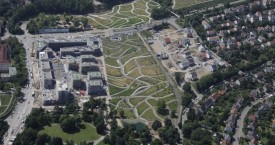Die Ziele der UN Agenda 2030 und des Pariser Klimaschutzabkommens vom Dezember 2015 müssen von den einzelnen Staaten konkretisiert und umgesetzt werden. Dies muss vor Ort, d.h. in unseren kommunen Geschehen auf der Grundlage von Rechtsvorschriften, Vereinbarungen und Selbstverpflichtungen. Deshalb braucht jede Kommune eine langfristige Entwicklungsstrategie, um die 17 Ziele der UN Agenda, vor allem das Ziel Nummer elf zu realisieren: Städte und Kommunen inklusiv, sicher, wiederstandsfähig und nachhaltig zu machen.
Dazu bedarf es einer ganzheitlichen Betrachtung der Kommune und deren Entwicklungspotenziale. Dazu hat Professor Doktor Schuster im November 2012 im oekom-Verlag München das Buch „Nachhaltige Städte – Lebensräume der Zukunft“ publiziert.
Als Konsequenz den beiden Rio-Konferenzen und der UN-Agenda 2030 wird deutlich, Nachhaltige Entwicklung ist nicht ohne Städte und nicht ohne BürgerInnen möglich. Nachhaltige Entwicklung bedarf eines ganzheitlichen Ansatzes und umfasst deshalb alle wesentlichen kommunalen Aufgabenfelder mit Leitzielen, Aufgaben und Lösungen.
21 kommunale Aufgabenfelder für eine nachhaltige Entwicklung
Leitziele – Aufgaben – Lösungen
1. Städtebauliche Entwicklung
2. Schutz der natürlichen Lebensgrundlagen
3. Energiewende
4. Klimawandel
5. Lebenslanges Lernen
6. Technologische Entwicklungen
7. Wirtschafts- und Arbeitsplatzentwicklung
8. Integrative Stadtgesellschaft
9. Demografische Entwicklung
10. Wohnen und Wohnumfeld
11. Mobilität für alle
12. Kultur in Vielfalt, Breite und Spitze
13. Sport und Bewegung
14. Freizeitgestaltung
15. Gesundheitsförderung
16. Nahrungsproduktion und Ernährung
17. Sicherheitspartnerschaft
18. Personalentwicklung
19. Finanzen
20. Bürgergesellschaft
21. Lokale-globale Verantwortung
Für eine Alltagskultur der Nachhaltigkeit
Zur Umsetzung einer langfristig angelegten Nachhaltigkeitsstrategie bedarf es eines gemeinsamen Verständnisses, einer kulturellen Basis in unserer Gesellschaft. Abgeleitet aus religiösen, philosophischen und rechtlichen Grundlagen lässt sich eine Alltagskultur der Nachhaltigkeit in drei Regeln zusammenfassen.
1. Fange bei dir selbst in deinem eigenen Verantwortungsbereich an
>>Sei du selbst die Veränderung, die du dir wünschst für diese Welt <<
(Mahatma Gandhi)
2. Berücksichtige bei deinem Handeln immer die Bedürfnisse der anderen
>>Was du nicht willst, das man dir tu‘, das füg‘ auch keinem anderen zu<<
(Goldene Regel)
3. Handle in Verantwortung für die nächsten Generationen, auch wenn du selbst keinen Vorteil davon hast
>>Eine Kultur blüht, wenn die Menschen Bäume pflanzen, in deren Schatten sie niemals sitzen werden<<
(alte Volksweisheit)
In diesem Geiste einer Kultur der Nachhaltigkeit können nachhaltige Städte entstehen, die für die Menschen zugleich Lebensräume der Zukunft sind.
The goals of the UN Agenda 2030 and the Paris Climate Protection Agreement from December 2015 need to be specified and implemented by the individual states. This needs to be done locally, in our municipalities based on legislative provisions, agreements and voluntary commitments. To achieve this, each municipality needs a long-term development strategy to implement the 17 goals of the UN Agenda, especially the goal number eleven: cities and municipalities need to become inclusive, safe, resilient and sustainable.
Therefore, the municipality and its development potentials need to be examined holistically. To assure this, in November 2012 Prof. Dr. Schuster published his book “Nachhaltige Städte – Lebensräume der Zukunft” (“Sustainable Cities – Living spaces of the future”), by oekom in Munich.
As a consequence of the two Rio-Conferences and the UN-Agenda 2030 it gets clear, sustainable development is not possible without cities and without citizens. Sustainable development needs a holistic approach which contains all essential local activities with goals, tasks and solutions.
21 local fields of action for a sustainable development
Goals – Tasks – Solutions
1. Urban development
2. Protection of natural resources
3. “Energiewende”, the change of the energy system
4. Climate change
5. Lifelong learning
6. Technological development
7. Economic development and development of employment
8. Integrative urban society
9. Demographic development
10. Housing and residential environment
11. Mobility for everyone
12. Cultural diversity, culture for everyone and high culture
13. Sport and exercise
14. Leisure activities
15. Health promotion
16. Food production and nutrition
17. Partnership for safety and security
18. Staff development
19. Finances
20. Civil society
21. Local-global responsibility
A common culture for sustainability
It needs a common understanding, a cultural base in our society for the realisation of a long term strategy of sustainability. Evolving out of religious, philosophical and legal basics, a common culture of sustainability could be summarised in three rules.
1. Start in your own area of accountability
>>Be the change you want to see in the world<<
(Mahatma Gandhi)
2. Always consider the needs of the others
>>You should not do to others what you would not want them to do to you<<
(Golden Rule)
3. Act responsible for the next generation, even if there is no advantage for you
>>A society grows great when old men plant trees whose shade they know they shall never sit in<<
(Greek proverb)
Sustainable cities, which are living spaces of the future for all people, will develop in this spirit of a common culture of sustainability.



